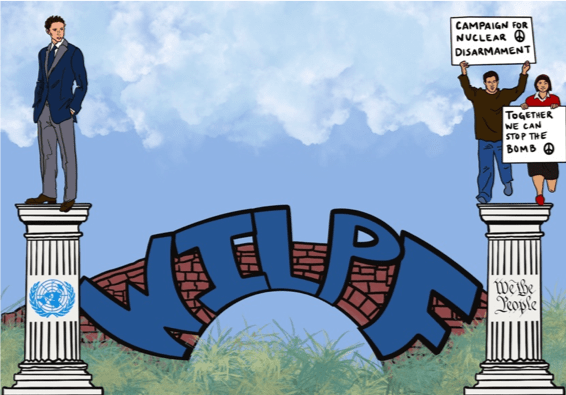The following reflection is from Mandi Karpo ‘23, a Pace University Political Science major who participated in the POL297L Global Politics of Disarmament and Arms Control class in Fall 2021. Students were given service learning assignments with disarmament advocacy organizations working in and around the UN Students were given service learning assignments with disarmament advocacy organizations working in and around the UN and New York City. Mandi’s assignment was with Reaching Critical Will, the disarmament program of the Women’s International League for Peace and Freedom (WILPF), the oldest women’s peace organization in the world.

Illustration by Mandi Karpo
My assignment involved monitoring the Fall 2021 session of the United Nations General Assembly First Committee (Disarmament and International Security) and writing up articles on youth and disarmament. I learned that First Committee comprises people just like you and me. However, a certain status, validity, and credibility allow these specific individuals to make decisions that affect massive populations. What goes on during these meetings has grown too complicated for the ordinary person to give attention or care.
Thus, I have learned the first and foremost important concept about myself; I am a tiny fish in a very large pond.
However, some organizations have enabled people like me to gain accessible information about what goes on in deep waters, no longer sheltering myself within my bubble of educational ignorance.
Through their Reaching Critical Will project, the Women’s International League for Peace and Freedom (WILPF) has provided a bridge of transparency and accountability between the private and public sectors. WILPF’s contribution to society provides a lens into the world of bureaucratic discussion and decision-making based on disarmament, international safety and security, and foreign policy.
To be frank, a lot of what I read within the First Committee’s draft resolutions went over my head. I often found myself stumbling over the complexity that resided in what first appeared to be simple language.
This brings me to the second important concept I have learned: my lack of historical context.
I learned about what factors contribute to a Member State decision to be in favor, to abstain, or to oppose a resolution, sometimes solely based on the outcome of a historical event. You cannot simply understand a nation’s decision without knowing the historical instance that brought that Member State to its final vote.
Most intriguing was the relationships between the certain Member States and seeing how these alliances sway the voting process one way or the other. For example, suppose the United States agrees on a particular resolution. In that case, we can presume that our nation’s allies, such as Japan, Australia, and South Korea, or those in the North Atlantic Treaty Organization (NATO), will follow our lead or vice versa.
However, understanding the historical context of what made these nations allies in the first place is just as important as the vote itself to fully comprehend decision-making when it arises. There is a subtle nuance within the voting process, a conversation between the Member States that is not verbally discussed yet speaks volumes when seen through final votes.
I had the privilege to observe patience, due diligence, and collective effort to be actively aware of the conflicts that international and domestic regions pose on one another. I have learned that global change is a prolonged and delicate process. Although resolutions have been made to create feasible action, society has not seen these substantial efforts come to fruition.
Nevertheless, even though citizens like me do not see First Committee decisions portrayed during my everyday life, acknowledging destructive political issues and presenting solutions to solve these conflicts is meaningful change within itself. The First Committee continues to make necessary changes in resolutions that have been reflected in the armed policies initiated by government bodies within their domestic regions. And eventually, the average population will see their tangible efforts in effect.
As it is the first step for the UN, I believe the first step for myself is to acknowledge what I do know and be open and dedicated to learning what I do not, including bureaucratic jargon and historical context. As a student, it is my responsibility to be consciously aware of this to continue becoming a well-rounded individual, academic, professional, and political advocate.
